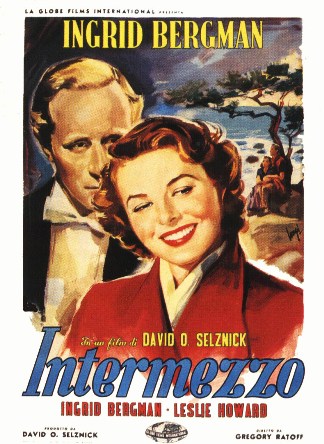
INTERMEZZO
US, 1939, 69 minutes, Black and white.
Leslie Howard, Ingrid Bergman, John Halliday, Edna Best, Cecil Kellaway.
Directed by Gregory Ratoff.
Intermezzo was Ingrid Bergman's first American film. She had made the same film in Sweden and attracted the notice of American producers. This version in which she stars movingly with Leslie Howard (in the same year as Gone With The Wind) was directed by actor/director Gregory Ratoff. It is brief, has all the archetypal ingredients of the love story ending with self-sacrifice and still retains its emotional impact. Despite the material becoming cliche material, this film comes across as one of the best of its kind. There is a famous love theme composed by Robert Henning and Heinz Provost. The theme of the film was similar to that of Interlude, filmed by Douglas Sirk in 1957 and Kevin Billington in 1968.
1. The archetypal love story? Romance, marriage, affair? Self-sacrifice? The vigour of this presentation? The perennial audience response?
2. The film introducing Ingrid Bergman to English-speaking audiences? The background of her Swedish career - and this film? Her impact in America? The film seen in the light of her subsequent career? Leslie Howard and his status at the tine? David Selznick's productions? The musical score use of classics and the title theme?
3. The title and the reference to the music? The significance of an intermezzo? Its use throughout the film: Holger and his composing it, Ann-Marie? and her playing it, Margit and her response,, Anita and her accompanying Holger? A romantic interlude before the main theme is continued?
4. The basic elements of the love and affair story? Audience expectations and response? The vigorous and humane treatment here? Emotional insight? The moralising tone?
5. The films establishing Holger and his success, Leslie Howard's presence and style. his skill in playing? The concerts, Charles and his crying,, Thomas and his farewell? Return home, Holger and Margit and their relationship? Eric and Ann-Marie? The meal and the seeming bypassing of Anita? Her invitation to the party? The party and family happiness? Ann-Marie? and her playing?
6. The attractiveness of Anita - Ingrid Bergman filmed and highlighted with glowing charm? Her place in the family., friendship with Margit, helping Ann-Marie?, playing at the party? Her own playing and Holger's noticing it? His change in attitude? Their chance meeting, going for the glass of wine, her talking about her admiration for him? The use of the music of 'Rustle of Spring' and its being played, visualised to highlight their falling in love? Anita's youthfulness, the exhilaration of the romance, hero-worship, her confronting decisions?
7. Holger and his falling in love with her, changing, letting his family go, Anita’s wanting to leave him. his coldness towards Margit, his persuading Anita not to go in the train? Her accompanying him in the concerts? The holidays together? Marianne and their friendship - and the indication that Holger was missing his children? The lyrical romantic scenes? Boats, picnics?
8. Anita and her visit to Margit, her excuse to leave the country, her intention to do so, Holger persuading her to go with him, the joy of accompanying him? The holiday? The letter and her scholarship? Thomas' visit? His persuading her to leave? The emotional intensity of her farewell? Holger and Thomas vanishing from her sight? Her going out of Holger's life?
9. Thomas and his influence on Anita, on pressuring Holger to sign the papers? Holger's comment about the end of the romance and his eventually forgetting Anita?
10. His wandering around, his return to Sweden, Ann-Marie's accident, the anxiety and her recovery, Margit welcoming him home?
11. How authentic the characters and plot? Audiences feeling the realities of the emotion and conflict? The stand in favour of marriage?